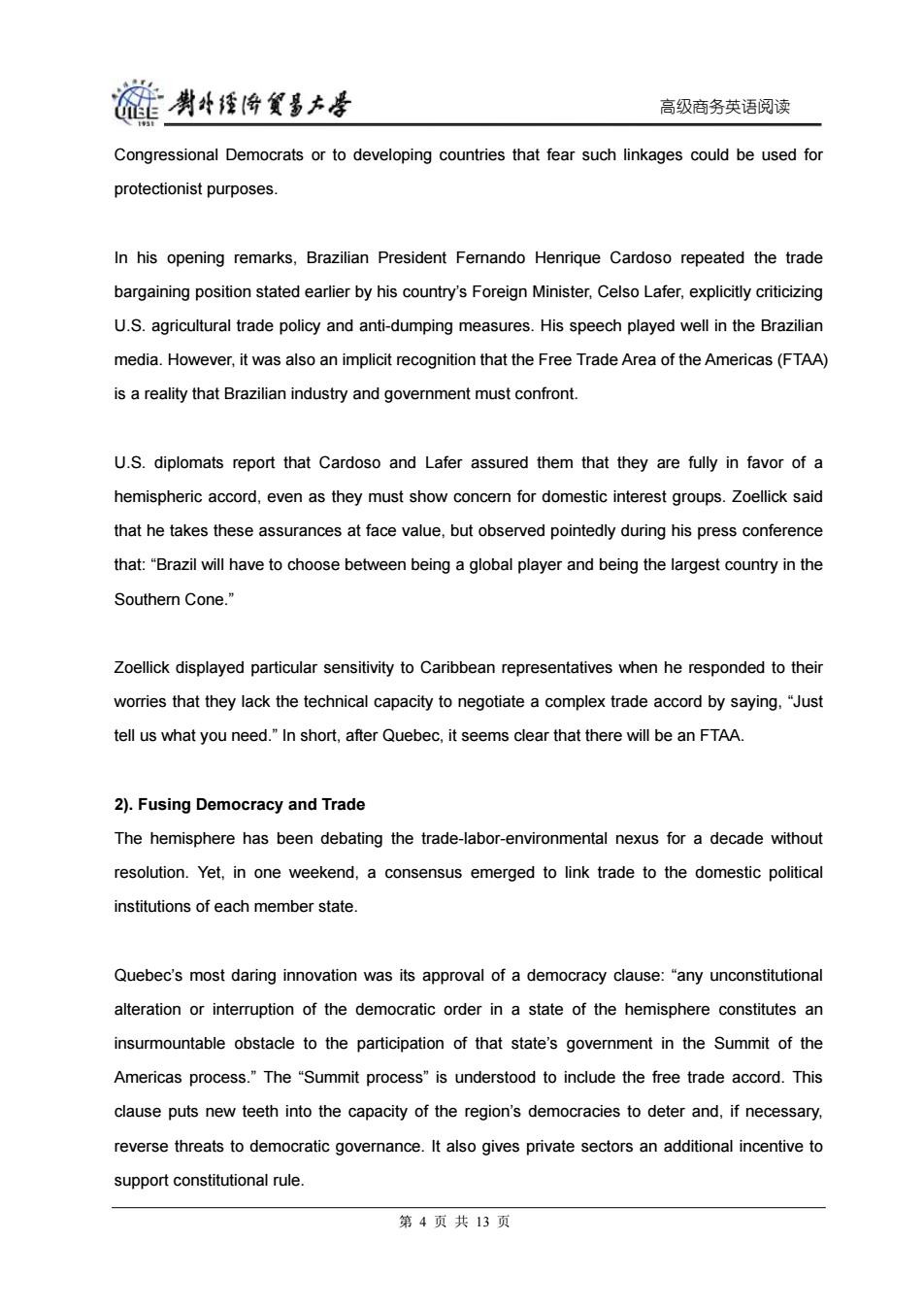正在加载图片...

爸剥撞降餐多大学 高级商务英语阅读 Congressional Democrats or to developing countries that fear such linkages could be used for protectionist purposes. In his opening remarks,Brazilian President Fernando Henrique Cardoso repeated the trade bargaining position stated earlier by his country's Foreign Minister,Celso Lafer,explicitly criticizing U.S.agricultural trade policy and anti-dumping measures.His speech played well in the Brazilian media.However,it was also an implicit recognition that the Free Trade Area of the Americas(FTAA) is a reality that Brazilian industry and government must confront. U.S.diplomats report that Cardoso and Lafer assured them that they are fully in favor of a hemispheric accord,even as they must show concern for domestic interest groups.Zoellick said that he takes these assurances at face value,but observed pointedly during his press conference that:"Brazil will have to choose between being a global player and being the largest country in the Southern Cone." Zoellick displayed particular sensitivity to Caribbean representatives when he responded to their worries that they lack the technical capacity to negotiate a complex trade accord by saying,"Just tell us what you need."In short,after Quebec,it seems clear that there will be an FTAA. 2).Fusing Democracy and Trade The hemisphere has been debating the trade-labor-environmental nexus for a decade without resolution.Yet,in one weekend.a consensus emerged to link trade to the domestic political institutions of each member state Quebec's most daring innovation was its approval of a democracy clause:"any unconstitutional alteration or interruption of the democratic order in a state of the hemisphere constitutes an insurmountable obstacle to the participation of that state's government in the Summit of the Americas process."The "Summit process"is understood to include the free trade accord.This clause puts new teeth into the capacity of the region's democracies to deter and,if necessary, reverse threats to democratic governance.It also gives private sectors an additional incentive to support constitutional rule. 第4页共13页高级商务英语阅读 Congressional Democrats or to developing countries that fear such linkages could be used for protectionist purposes. In his opening remarks, Brazilian President Fernando Henrique Cardoso repeated the trade bargaining position stated earlier by his country’s Foreign Minister, Celso Lafer, explicitly criticizing U.S. agricultural trade policy and anti-dumping measures. His speech played well in the Brazilian media. However, it was also an implicit recognition that the Free Trade Area of the Americas (FTAA) is a reality that Brazilian industry and government must confront. U.S. diplomats report that Cardoso and Lafer assured them that they are fully in favor of a hemispheric accord, even as they must show concern for domestic interest groups. Zoellick said that he takes these assurances at face value, but observed pointedly during his press conference that: “Brazil will have to choose between being a global player and being the largest country in the Southern Cone.” Zoellick displayed particular sensitivity to Caribbean representatives when he responded to their worries that they lack the technical capacity to negotiate a complex trade accord by saying, “Just tell us what you need.” In short, after Quebec, it seems clear that there will be an FTAA. 2). Fusing Democracy and Trade The hemisphere has been debating the trade-labor-environmental nexus for a decade without resolution. Yet, in one weekend, a consensus emerged to link trade to the domestic political institutions of each member state. Quebec’s most daring innovation was its approval of a democracy clause: “any unconstitutional alteration or interruption of the democratic order in a state of the hemisphere constitutes an insurmountable obstacle to the participation of that state’s government in the Summit of the Americas process.” The “Summit process” is understood to include the free trade accord. This clause puts new teeth into the capacity of the region’s democracies to deter and, if necessary, reverse threats to democratic governance. It also gives private sectors an additional incentive to support constitutional rule. 第 4 页 共 13 页